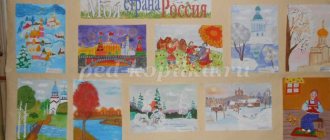An important step on the path to kindness and respect for the people around us is politeness. You can learn how to behave correctly in order to be a polite person from the presented teaching materials for conducting the thematic lesson (class hour) “Polite words”.
Author: Vasilyeva Olga Anatolyevna
Recommendations for working with materials for the thematic lesson (class hour) “Polite words” for students in grades 3–5
Lesson option [PDF] [DOCX] Presentation [PDF] [PPTX]
Goal: development of ethical feelings, goodwill and emotional and moral responsiveness, understanding and empathy for the feelings of other people.
Tasks:
- develop the ability to correctly build dialogues with peers and adults;
- create positive behavioral experience;
- develop ideas about politeness, polite behavior and respectful behavior towards other people.
The methodological material is advisory in nature; The teacher, at his own discretion, can make adjustments to the course of the lesson, change tasks, their complexity and quantity.
Task No. 1.
Read an excerpt from V. Oseeva’s story “The Magic Word.”
“A little old man with a long gray beard was sitting on a bench and drawing something in the sand with an umbrella. “Move over,” Pavlik told him and sat down on the edge. The old man moved and, looking at the boy’s red, angry face, said: “What’s wrong with you?” did that happen? - Well, okay! What do you care? – Pavlik looked sideways at him. “Nothing for me.” But now you were screaming, crying, quarreling with someone... - Of course! – the boy muttered angrily. “I’ll soon run away from home completely.” – Will you run away? – I’ll run away! I’ll run away because of Lenka alone. – Pavlik clenched his fists. “I almost gave her a good one just now!” Doesn't give any paint! And how much do you have? - Doesn’t it? Well, there’s no point in running away because of that.” “Not only because of that.” Grandma chased me out of the kitchen for one carrot... just with a rag, a rag... Pavlik snorted with resentment. “It’s nothing!” - said the old man. - One will scold me, the other will feel sorry. - No one feels sorry for me! - Pavlik shouted. “My brother is going for a boat ride, but he doesn’t take me.” I tell him: “You better take it, I won’t leave you anyway, I’ll drag the oars away, I’ll climb into the boat myself!” Pavlik slammed his fist on the bench. And suddenly he fell silent. “Well, your brother won’t take you?” “Why do you keep asking?” The old man smoothed his long beard: “I want to help you.” There is such a magic word... Pavlik opened his mouth. “I’ll tell you this word.” But remember: you need to say it in a quiet voice, looking straight into the eyes of the person you are talking to. Remember - in a quiet voice, looking straight into the eyes... - What word?..”
1. Guess what “magic” word the old man told Pavlik. 2. Why is it “magical”? 3. Are there other words that we can call “magical?” 4. What do you think is the “magic” of such words? 5. Guess what we will talk about today?
Task No. 2.
Look at the words on the slide.
1. Choose the words that you most often use when communicating. 2. What can you call a person who constantly uses such words? (Polite) 3. What impression does a polite person make on others?
Task No. 3.
Read an excerpt from V. Oseeva’s story “The Magic Word”
“... – This is a magic word. But don’t forget how to say it. “I’ll try,” Pavlik grinned, “I’ll try right away.” He jumped up and ran home. Lena was sitting at the table and drawing. Paints - green, blue, red - lay in front of her. Seeing Pavlik, she immediately raked them into a pile and covered them with her hand. “The old man deceived me!” – the boy thought with annoyance. “Will someone like that understand the magic word!” Pavlik walked sideways towards his sister and pulled her by the sleeve. The sister looked back. Then, looking into her eyes, in a quiet voice the boy said: “Lena, give me one paint... please...” Lena opened her eyes wide. Her fingers unclenched, and, taking her hand off the table, she muttered embarrassedly: “Which one do you want?” “I want the blue one,” Pavlik said timidly. He took the paint, held it in his hands, walked around the room with it and gave it to his sister. He didn't need paint. He was now thinking only about the magic word: “I’ll go to grandma. She's just cooking. Will he drive you away or not?” Pavlik opened the door to the kitchen. The old woman was removing hot pies from the baking sheet. The grandson ran up to her, turned her red, wrinkled face with both hands, looked into her eyes and whispered: “Give me a piece of pie... please.” The grandmother straightened up. The magic word shone in every wrinkle, in the eyes, in the smile... - I wanted something hot... something hot, my darling! – she said, choosing the best rosy pie. Pavlik jumped for joy and kissed her on both cheeks. “Wizard!” Wizard!" - he repeated to himself, remembering the old man. At dinner, Pavlik sat silent and listened to every word of his brother. When his brother said that he would go for a boat ride, Pavlik put his hand on his shoulder and quietly asked: “Take me, please.” Everyone at the table immediately fell silent. The brother raised his eyebrows and grinned. “Take it,” the sister suddenly said. - What does it cost you! - Well, why not take it? - Grandma smiled. “Of course, take it.” “Please,” Pavlik repeated. The brother laughed loudly, patted the boy on the shoulder, ruffled his hair. “Oh, you traveler!” Okay, get ready.” It helped! It helped again!” Pavlik jumped out from the table and ran into the street. But the old man was no longer in the park. The bench was empty, and only the incomprehensible signs drawn by an umbrella remained on the sand.”
1. Think about what main idea the author of the story wanted to convey to the reader. 2. Do you think the hero of the story achieved “magic” with the help of words? 3. Why did the old man draw Pavlik’s attention to the fact that the word needs to be pronounced in a special way? 4. Think about the power one word can have.
Task No. 4. Read the aphorisms.
“Nothing costs us so little or is valued so dearly as politeness.” M. Cervantes
— Politeness is an artificially created good mood. Thomas Jefferson
— Politeness is kindness in small things. Thomas Macaulay
— Politeness is the desire to always receive polite treatment and be known as a courteous person. Francois La Rochefoucauld
1. Using the above statements, try to formulate a definition of the word “politeness”. 2. What words can be used to complement the concept of “politeness”?
Task No. 5.
Read the poem “Impolite Politeness” by I. Kulskaya:
“Petrus promised his father... - I'll take care of politeness. I will thank everyone, be the first to say “hello”!
Here is a boy who diligently fulfills his promise. He sees that in the morning at the gatehouse the watchman is dozing on the threshold. He didn’t sleep at night at his post, he just dozed off.
And Petrus yells: “Good morning, Grandfather Fedot!” His grandfather scolded him in his sleep: “Get out, little shooter!”
Now Petrus has caught up with Yarinka, and then he pulls her scarf; - Where are you going, Yarina, stop, I say hello to you! – She pulled aside... How impolite the girl is!
The counselor was carrying a pile of books, and Petro jumped from the fence! I almost sat on his shoulders: “Sorry, good evening!” “You,” the counselor shouted, “are both ignorant and impudent!”
Petya is very surprised: Was he impolite?!”
1. Do you think the hero of the poem managed to be polite, as he promised his father? Justify your answer. 2. What does Petya need to change in his behavior? Discuss each situation described by the author. 3. Do you think it is possible to use words without understanding their meaning? Did Petya understand the meaning of the words he spoke?
Task No. 6.
Work in groups.
Read the dialogues by role, filling in the missing words:
1. (Talking on the phone) - ..., call, ..., Katya. - Okay, I’ll call you now. - Big... -...
2. (Communicating with strangers on the street) - Hello, tell me... where the library is. – Of course, go straight, turn left and you are at the library. - ... - ...
1. (Talking on the phone) - Hello, please call Katya. - Okay, I’ll call you now. - Thank you very much. - Please.
2. (Communicating with strangers on the street) - Hello, please tell me where the library is. – Of course, go straight, turn left and you are at the library. - Thank you. - My pleasure.
Task No. 7.
Watch an excerpt from the film magazine "Yeralash" "Let's compliment each other."
1. What polite words do the characters use in the video clip? (Please don't refuse the courtesy, if you don't mind, please allow me, you're welcome, could you please, thank you very much).
2. Why do you think that after the announcer announced the end of the day of politeness, all the characters began to behave differently?
3. Suggest what a person must develop in order to be polite? (Habit).
4. What do you think a person needs to do to develop the habit of speaking politely?
Task No. 8.
Match the words with as many expressions (synonyms) that replace them as possible:
Hello -... Thank you - ... Please - ... Sorry - ... Goodbye - ...
Hello - good afternoon, good evening, good morning Thank you - thank you Please - be kind, be kind, good health, do not refuse kindness, allow me, welcome Sorry - I beg your forgiveness Goodbye - see you
Task No. 9.
Read an excerpt from S. Marshak’s poem: “If you are polite” And are not deaf to your conscience, You will give way to the old woman without protest.
If you are polite In your heart, and not for show, You will help a disabled person get on the trolleybus.
And if you are polite, Then, sitting in class, you and your friend will not chatter like two magpies.
And if you are polite, you will help your mother and offer her help without asking - that is, yourself ... "
1. According to the author of the poems, a person who is used to being polite is polite himself, without coercion or reminders. Do you agree with this idea of the author? 2. Think about why it is important for a person to be polite.




